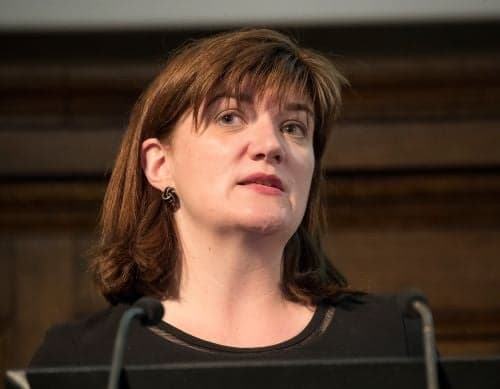Treasury Committee Chair Nicky Morgan gives CTA Address (plus audio)
Nicky Morgan MP, Chair of the House of Commons Treasury Committee, used her invitation from the CIOT to give the 2018 CTA address, to explain the role of the committee, briefly outline its current work and speculate on why tax has become such a hot topic in the media, as well as raise concerns about HMRC’s customer service.
The role of her ‘engine room’ committee is to bring ‘scrutiny and accountability’ to the tax policy process, she said, with a wish to see a simpler tax system, with fewer unintended consequences for taxpayers. The MP said the role of the committee has been heightened because of the shift of power from the Cabinet to the floor of the Commons as a result of the General Election result in 2017. Morgan urged attendees to contact the committee with suggestions of future inquires and ‘short, sharp’ input on existing ones: “You cannot rival hearing evidence from the horse’s mouth’, she said. “[We] need engagement with people who know how a tax change will work.” The committee is concerned by matters that can cause harm to the public, which explains the emphasis under her chairmanship on the impact of matters on consumers, such as inquires about TSB, VAT, HMRC and Brexit.
Morgan (below) suggested that tax news stories have been able to ‘cut through’ to the public psyche in the past eight years because of residual irritation in society about the management of the financial and banking crisis. There is certainly the need for a more informed debate about tax, she believes. The MP said there is a consensus among MPs of the need to act on the lack of diversity in the staff of organisations in the financial services sector. Morgan is a former Minister for Women and Equalities.

The former Secretary of State for Education praised the CIOT’s Low Incomes Tax Reform Group (LITRG)’s input into the committee’s report on childcare – see more here. The report draws attention to LITRG’s suggestion that low up-take of Tax-Free Childcare was partly explained by lack of advertising and publicity for the scheme. And that the majority of people who pay childcare costs are unlikely to understand this range of interactions in child-related benefits, such as Tax-Free Childcare and tax credits, and yet the consequences of failing to understand can be very serious.
On HMRC, Morgan understood the public’s frustration at customer service standards at HMRC, especially when there are plans to rollout Making Tax Digital and reorganisation of HMRC offices. The committee has a role to play to ensure HMRC is enacting the Government’s agenda.
The May 22 2018 event was held at ICE, London.
There ensued a panel discussion with Maya Forstater, of the Centre for Global Development, Stella Amiss, of PWC and Blick Rothenberg’s Heather Self, and Morgan, chaired by CIOT President Ray McCann.
Peter Rayney, the Institute’s new Vice-President, called for tax to be a compulsory part of the National Curriculum for school children given people’s long term exposure to it. Morgan said: “I do not disagree with the premise of the question. PSHE will be introduced back into the secondary school curriculum and the ‘e’, economics, can be incorporated in any way.” She added that it is important that young people understand who pays tax, where it goes and what it funds.
In answer to a question about whether HMRC should risk going beyond its regulatory perimeter to tackle tax avoidance and evasion, Morgan said it is important that there is and there is seen to be, an even playing field for all taxpayers who should all be bound by the same rules. Interestingly, Morgan told another questioner who asked about the importance of a competitive tax regime, that alterations to business rates ‘make a bigger difference to business rather than [cuts to] corporation tax’.
Self suggested there is a need for an ‘anti-GAAR Panel’ to counter the increase in powers that HMRC have.
Glyn Fullelove, Chair of the CIOT’s Technical Committee, asked the panel for their impression of whether people would vote for a political party that was explicit about putting taxes up to pay for public services. Morgan said ring-fencing some budgets may find favour with the public but a party would face a ‘challenge; to be honest’ if they campaigned to put up headline rates of tax.
Forstater told the audience that she often warns people that there is not a pot of gold to be expected from the current crackdown on tax avoidance and evasion. She finds it quite startling that people are talking about transfer pricing and profit shifting over their breakfast cereal, although the public debate on these matters is often misinformed. “Fairness and equality is not part of a tax advisers toolkit but that is where the public debate is’.
Amiss stated that everyone believes in a sustainable tax system. Amiss said the New Citizen’s Jury she is involved in has shown that most people get information about tax from what they read in newspapers – so it makes sense for the tax profession to target that media. People care most about the NHS, she found, followed by automation and the ‘generational divide’ in wealth.
Listen to the Introduction by CIOT President Ray McCann here.
You can listen to Nicky Morgan's CTA Address here.
Listen to the Q&A session (Panellists: Maya Forstater, Centre for Global Development, Heather Self, Blick Rothenberg, Stella Amiss, PWC and Nicky Morgan MP) here.
By Hamant Verma
